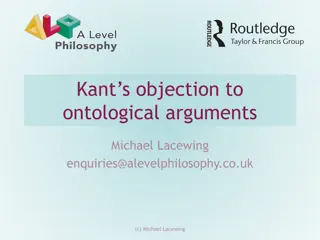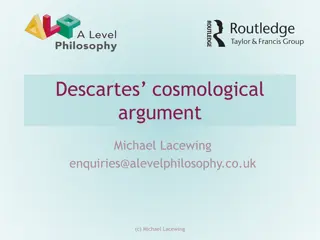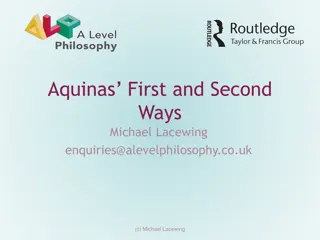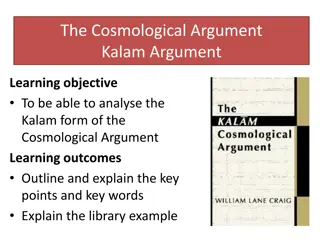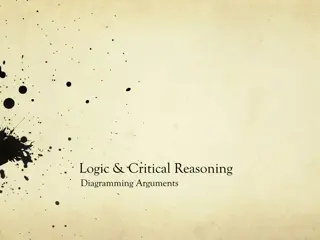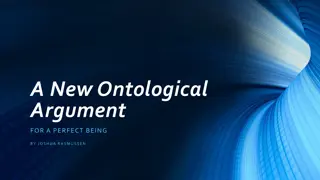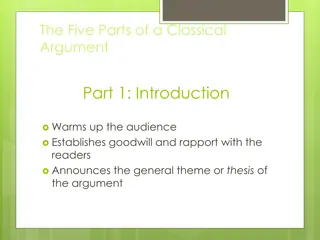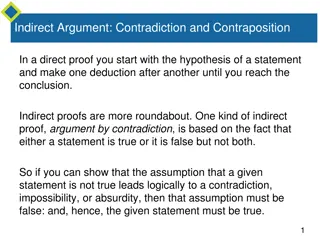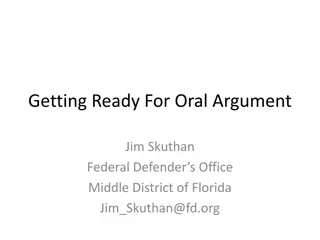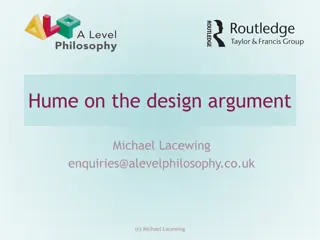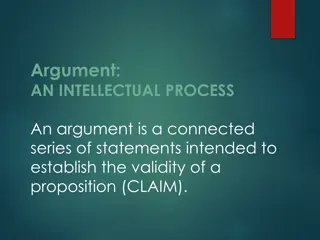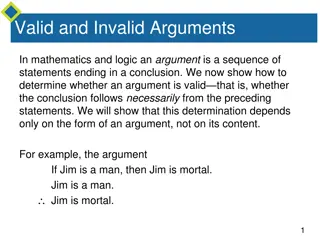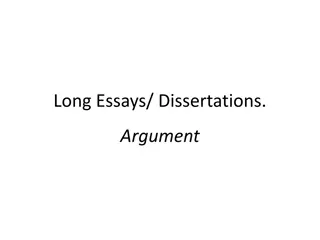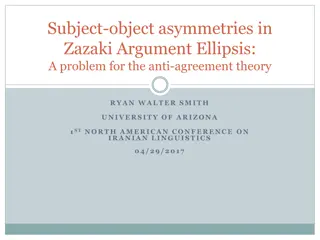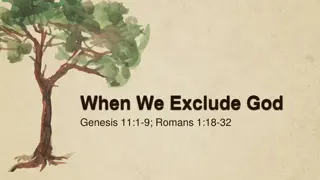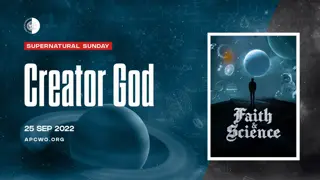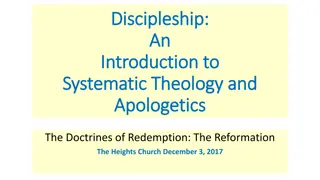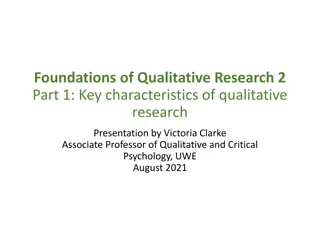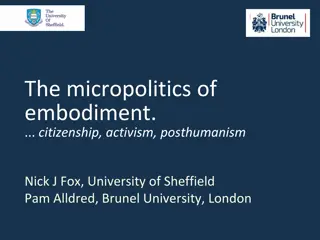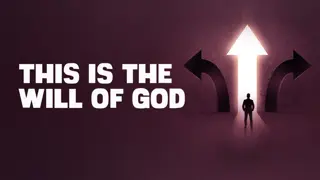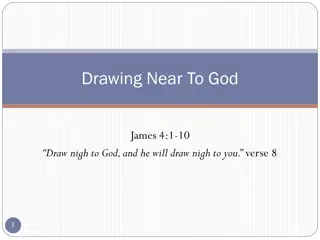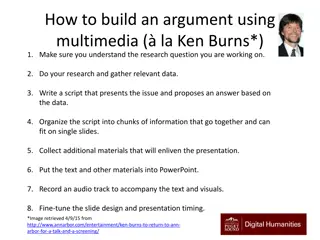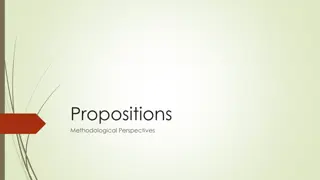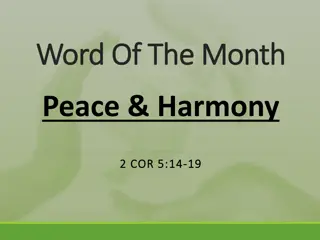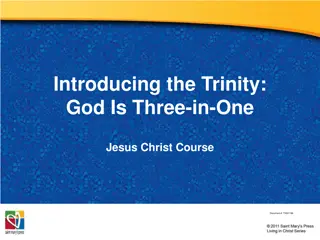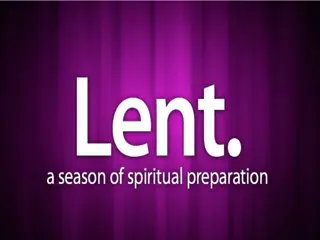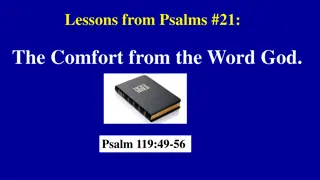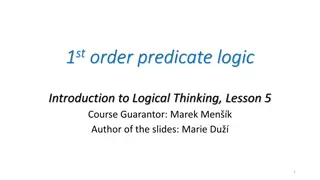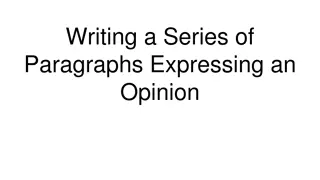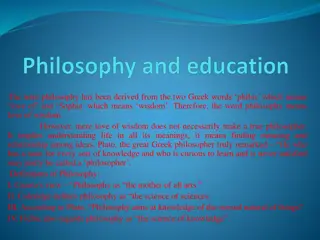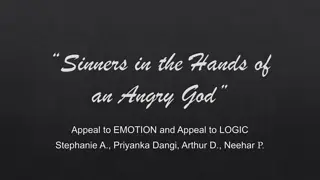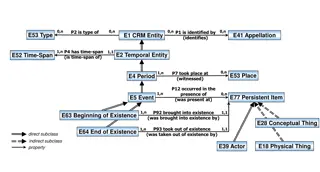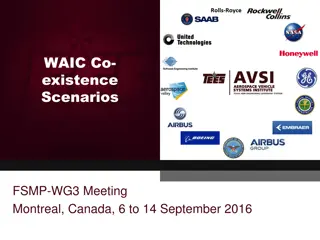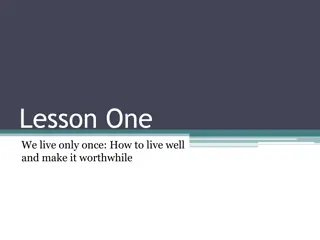Understanding Anselm's Ontological Argument for the Existence of God
Anselm's Ontological Argument posits that the greatest possible being, referred to as God, must exist in reality because existing in reality is greater than existing only in thought. This argument centers on the concept of necessary vs. contingent beings and the idea that the greatest being cannot exist solely as an idea in the mind.
Download Presentation

Please find below an Image/Link to download the presentation.
The content on the website is provided AS IS for your information and personal use only. It may not be sold, licensed, or shared on other websites without obtaining consent from the author. Download presentation by click this link. If you encounter any issues during the download, it is possible that the publisher has removed the file from their server.
E N D
Presentation Transcript
The Ontological Argument for the Existence of God
Why is the ontological argument called ontological ? Compound word onto-logia (study of being): Onto- (Greek: , on; , ontos, being. and Logia (- , logical discourse).
The first ontological argument in the Western Christian tradition was proposed by Anselm Archbishop of Canterbury in his 1078 work Proslogion.
What is the existential reference of the word God? According to Anselm, the word God refers to that than which nothing greater can be conceived. In other words, God is the greatest possible being
What does it mean, greatest possible being? Omnipotent Omniscient Omnibenevolent Omnipresent Eternal Necessary Lacking nothing
Necessary beings (i.e., things with necessary existence) cannot not-exist. Impossible beings (i.e., things whose existence is contradictory, e.g., round squares) cannot exist.
Contingent beings (i.e., beings whose existence and nonexistence are neither necessary nor impossible) May exist (rocks) Or not (unicorns). Their existence is (logically) possible, Their nonexistence is also (logically) possible.
Anselms ontological argument Even an atheist has the concept God, of the greatest possible being. Such a thing exists in their intellect. Something that exists in reality is greater than something that exists only in thought. (Think of a lottery win. One that exists in reality is greater than one that exists only in the mind). So, if he is the greatest, God must exist in reality.
Anselms 1st argument The greatest possible being cannot exist only as an idea in the mind because, in addition to existing as an idea in the mind, it can also be thought of as existing (in reality), which is greater than existing only as an idea in the mind. 1. Ifthe greatest possible being exists only as an idea in the mind, then there is a being that is greater: one that exists in the mind and in reality which is impossible because it is self-contradictory. 2. So, the greatest possible being must exist, not only as an idea in the mind, but in reality. 3.
In other words, A God that exists in the mind and in reality is greater than a God that exists only in the mind. 1 If God exists only in the mind, then God is not God because God is the greatest possible being (one that exists in the mind and in reality). 2 Thus, the claim that God does not exist (in reality) implies a contradiction and is, therefore, necessarily false. 3 If the claim that God does not exist (in reality) is necessarily false, then the claim that God exists (in reality) is necessarily true (because the negation of a contradiction is self-evident). 4
Anselms 2Nd Argument 1. It is possible to think ofa necessary being. A necessary being would be greater than a contingent being. 2. Ifthe greatest possible being could be thought of as not existing, it would be a contingent being. But then, the greatest possible being would not bethe greatest possible being, which is an outright contradiction and thus absurd. 3. The greatest possible being has necessary existence, i.e., its nonexistence is impossible. 4.
In other words, It is possible to think of a necessary being, i.e., a being whose nonexistence is impossible. Necessary existence is greater than contingent existence, and a necessary being is greater than a contingent being. If the nonexistence of God is possible, then God must be a contingent being. But then God (the greatest possible being) would not be God because a contingent being cannot be the greatest possible being. Thus, the claim that God s nonexistence is possible implies a contradiction and is therefore necessarily false. If the claim that God's nonexistence is possible is necessarily false, then the claim that God s nonexistence is impossible is necessarily true (because the negation of a contradiction is self-evident).
God is the ONLY BEING whose nonexistence is logically impossible. That is, no other being deserves the title of the greatest possible being
The existences of all other beings (actual or conceivable) are either contingent or impossible.
How can anyone doubt or deny the existence of God? Anselm s answer: The fool (i.e., the atheist or agnostic) does not understand the true meaning of the greatest possible being.
Ren Descartes (1596 1650) Existence can no more be separated from the essence of God than the fact that its three angles equal two right angles can be separated from the essence of a triangle. A green triangle: green can be separated from triangle. A triangle whose angles equal two right angles (180 degrees): cannot separate 180 degrees from triangle. God exists: cannot separate existence from God.
Anselm (and Descartes) assumes that the existence of the greatest possible being is logically possible.
Criticisms of Anselms arguments In the 1st premise of his 1Stargument, Anselm says that The greatest possible being cannot exist only as an idea in the mind because, in addition to existing as an idea in the mind, it can also be thought of as existing in reality, which is greater than existing only as an idea in the mind. In the 3Rd premise of his 2Ndargument, Anselm says that Ifthe greatest possible being could be thought of as not existing, it would be a contingent being. But then, the greatest possible being would not bethe greatest possible being, which is an outright contradiction and thus absurd.
Gaunilos response to Anselm Gaunilo was a contemporary of Anselm, he was a monk who rejected Anselm s argument (not the existence of God). 1 I can conceive of _____________ 2 Such an _________ must possess all perfections 3 Existence is a perfection/predicate 4. Conclusion: Therefore, the perfect ________ exists
The Perfect Island The greatest possible island cannot exist only as an idea in the mind because, in addition to existing as an idea in the mind, it can also be thought of as existing (in reality), which is greater than existing only as an idea in the mind. Ifthe greatest possible island exists only as an idea in the mind, then there is an island that is greater: one that exists in the mind and in reality which is impossible because it is self-contradictory. So, the greatest possible island must exist, not only as an idea in the mind, but in reality. But there is no such thing as the greatest possible island! So, this argument is fallacious. By the same token, then, Anselm s argument is fallacious.
Two Responses to Gaunilo First: islands are contingent but not necessary things. A necessary island is nonsense. Such an island would have to exist. And if it existed, is could be destroyed and therefore it would not be a perfect island. By contrast, God is not a physical thing. Second: an island can never possess maximal properties. You can always add more, more tasty fruit, softer and softer sand, more trees, etc. God is fundamentally different because the properties he is supposed to possess are maximal properties: all-powerful, all-knowing, all-loving, etc.
The essential claim is Existence is a property or quality of God s nature. By analysing the word God it will be obvious, according to Anselm, that God exists. Compare: A triangle = three-sided figures whose sum of internal angles equals 180 degrees. God = exists
Kants objections First: Existence is not a real property, not a concept of something that could be added to the concept of a thing (B626) God exists is not saying something like A triangle s internal angles equal 180. In God exists we attach no new predicate to the concept of God, but only posit the subject in itself with all its predicates as being an object that stands in relation to my concept (B627) That God exists is the very thing that Anselm needs to prove. Second: God does not exist is not self-contradictory. Any statement about an object can be self-contradictory, but if the object is held not to exist in the first place, then it has no essence to be contradicted.
Lets look at another version of the ontological argument. Plantinga and Malcolm
Malcolm Norman Malcolm: God s existence is either possible or impossible. It is not impossible. So, God s existence is possible. If possible, God is either contingent or necessary. Since God cannot be contingent, then God is necessary. Therefore, God must necessarily exist. (1911 1990)
Plantingas Argument 1. The concept of a maximally great being is self-consistent (omniscient, omnipotent, morally perfect) . 2. If 1, then there is at least one logically possible world in which a maximally great being exists. 3. Therefore, there is at least one logically possible world in which a maximally great being exists. 4. If a maximally great being exists in one logically possible world, it exists in every logically possible world. 5. Therefore, a maximally great being (that is, God) exists in every logically possible world.
The Good: Existence is not a Property Plantinga s modal version avoids Kant s criticisms. Plantinga does not claim that existence is a property. Nor does he claim that a God that exists in reality is greater than one that exists only in thought. Rather, Plantinga claims that there is a serious logical possibility that God exists in at least one possible world.
The Bad: S5 System Of Modal Logic Plantinga s Premise 4 If a maximally great being exists in one logically possible world, it exists in every logically possible world is a contested modal principle. The S5 system of modal logic includes an axiom that looks suspicious: AxS5: If A is possible, then it is necessarily true that A is possible.
How might it be shown that the existence of God
Evil? 1. If there is dysteleological evil (pointless, purposeless, or meaningless pain & suffering), then the existence of a Perfect Being is impossible. 2. There is dysteleological evil. 3. The existence of a PB is impossible. Can it be known whether premise 2 is true?
So, whats the verdict? Does the ontological argument prove that God exists?



